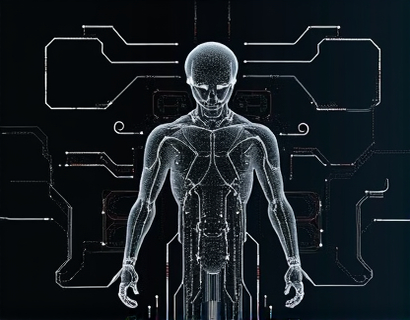AI Certification Pathways: Empowering Digital Success with Specialized Accreditation
In the rapidly evolving digital landscape, acquiring specialized skills in Artificial Intelligence (AI) has become paramount for career advancement and educational growth. The integration of AI into various industries has created a high demand for professionals who can leverage these technologies effectively. To meet this demand, a structured AI certification pathway has emerged, offering individuals and organizations a pathway to validate their skills and knowledge through recognized credentials. This article delves into the importance of AI certification, the benefits it brings to career development, and the structured pathways available to achieve these accreditations.
Understanding the Importance of AI Certification
The significance of AI certification lies in its ability to provide tangible proof of an individual's expertise in a rapidly growing field. As AI continues to transform industries, employers seek candidates with verified skills and knowledge. Certification serves as a credible indicator of a professional's ability to apply AI concepts and technologies in real-world scenarios. It not only enhances personal credibility but also increases job prospects and career advancement opportunities.
Moreover, AI certification helps bridge the gap between academic knowledge and practical application. Traditional education often focuses on theoretical foundations, while practical experience is crucial in tech-driven fields. Certification programs offer hands-on experience through completed tasks and educational milestones, ensuring that learners are well-prepared for the challenges of the industry.
Enhancing Professional Credibility and Job Prospects
Professional credibility is a critical factor in career success, and AI certification plays a pivotal role in establishing this. A certification from a reputable institution signifies that an individual has met specific industry standards and possesses the necessary skills to excel in AI-related roles. This credibility is particularly valuable in a field where technology evolves rapidly, and continuous learning is essential.
In terms of job prospects, AI certification can be a decisive factor for employers. It demonstrates a candidate's commitment to staying updated with the latest trends and technologies. Recruiters often look for certifications as a way to quickly assess a candidate's qualifications, saving time and resources in the hiring process. This can significantly enhance an individual's chances of securing a position in a competitive job market.
Structured AI Certification Pathways
To navigate the complex landscape of AI certifications, structured pathways have been developed to guide learners through a logical and comprehensive learning process. These pathways are designed to cater to various levels of expertise, from beginners to advanced professionals, ensuring that everyone can find a suitable starting point.
For beginners, entry-level certifications focus on foundational concepts such as machine learning, data analysis, and basic programming. These certifications provide a solid base and help individuals understand the core principles of AI. As learners progress, they can move on to intermediate certifications that delve deeper into specific areas like natural language processing, computer vision, and predictive analytics.
Advanced certifications are designed for professionals who already have a strong grasp of AI concepts and seek to specialize in niche areas or lead AI projects. These certifications often involve complex projects and real-world applications, providing a comprehensive understanding of AI systems and their implementation.
Certification for Different Skill Levels
Beginner Certifications: These certifications are ideal for individuals new to AI. They cover essential topics such as:
- Introduction to AI and machine learning
- Data preprocessing and feature engineering
- Basic programming with Python or R
- Understanding neural networks and deep learning
Intermediate Certifications: For those with some experience, intermediate certifications expand on foundational knowledge and introduce more advanced concepts:
- Advanced machine learning techniques
- Natural language processing (NLP)
- Computer vision and image recognition
- Data-driven decision making
Advanced Certifications: These are designed for professionals looking to specialize or lead AI initiatives:
- AI project management and leadership
- Ethical considerations in AI
- Advanced deep learning architectures
- Building and deploying AI models in production environments
Maximizing Career and Educational Potential
Engaging in AI certification programs not only enhances professional credentials but also contributes to continuous educational growth. The tech industry is characterized by constant innovation, and staying updated is crucial for long-term success. Certification pathways offer a structured way to keep learning and adapting to new developments.
For students and professionals alike, these programs provide a clear roadmap for skill development. By completing tasks and educational milestones, learners gain practical experience and a deeper understanding of AI concepts. This hands-on approach ensures that the knowledge gained is applicable in real-world scenarios, making the certification highly valuable.
Additionally, many certification programs offer flexible learning options, including online courses, self-paced modules, and interactive projects. This flexibility accommodates different learning styles and schedules, making it easier for individuals to balance their professional and personal commitments while pursuing certification.
Choosing the Right Certification Program
With numerous certification options available, selecting the right program is crucial for maximizing benefits. Here are some factors to consider when choosing an AI certification pathway:
- Alignment with career goals: Ensure the certification aligns with your professional aspirations and the industry you are targeting.
- Reputation of the issuing organization: Opt for certifications from well-respected institutions with a strong industry presence.
- Curriculum relevance: Check that the course content covers the latest trends and technologies in AI.
- Practical components: Look for programs that include hands-on projects and real-world applications to enhance learning.
- Community and support: Consider the availability of community forums, mentorship, and support resources to aid in your learning journey.
Recommended Certification Programs
While there are many certification programs available, here are a few notable ones that have gained recognition in the industry:
1. Google AI Professional Certificate: This program offers a comprehensive introduction to AI, covering key concepts and practical applications. It is ideal for those new to AI and looking to build a strong foundation.
2. Microsoft Certified: Azure AI Engineer Associate: Designed for professionals with some AI experience, this certification focuses on building and deploying AI models using Microsoft Azure platforms.
3. IBM Data Science Professional Certificate: This program covers a broad range of data science topics, including AI, and is suitable for individuals looking to transition into data science roles.
4. Coursera's Machine Learning Course by Andrew Ng: While not a traditional certification, this course is highly regarded and provides a deep understanding of machine learning principles, often serving as a stepping stone to further certifications.
Conclusion
AI certification pathways offer a structured and effective way to enhance career and educational potential in the digital age. By validating skills and knowledge through recognized credentials, individuals can significantly boost their professional credibility and job prospects. The flexibility and practical focus of these programs make them accessible and beneficial for learners at all levels.
As the demand for AI expertise continues to grow, investing in AI certification is a strategic move for anyone looking to thrive in the tech industry. Whether you are a beginner or an advanced professional, there is a certification pathway that can help you achieve your goals and stay ahead in the ever-evolving landscape of artificial intelligence.










































